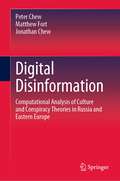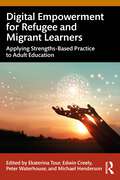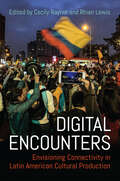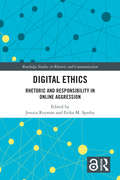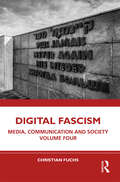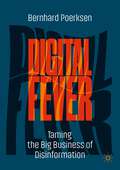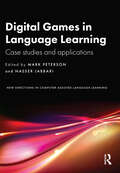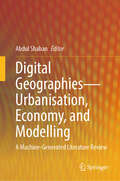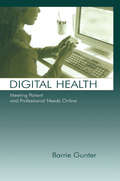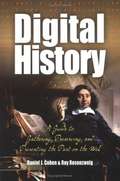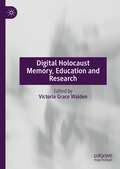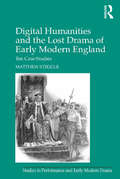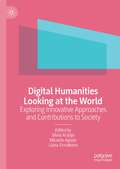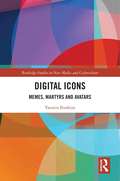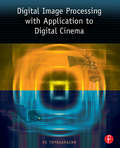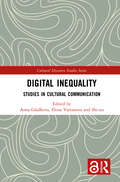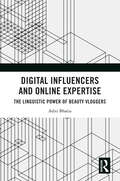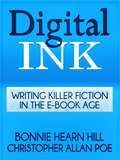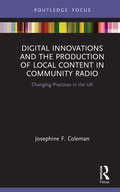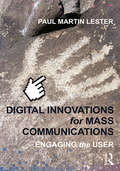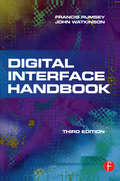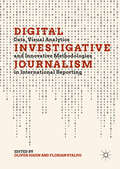- Table View
- List View
Digital Disinformation: Computational Analysis of Culture and Conspiracy Theories in Russia and Eastern Europe
by Peter Chew Matthew Fort Jonathan ChewThis book uniquely combines the authors’ personal experiences, deep cultural and professional experience of living and working in Russia and the former USSR, and interest and experience with language and computational analysis, to shed light on a highly contemporary question: what is motivating conflict and unrest in Russia and its surrounding countries? How does Russian government suppression of information manifest in practice today, and how does it fit into the historical cultural pattern for Russia? The authors take a computational look at social and traditional media in the original languages, from Russia, Ukraine, Lithuania, Latvia, Estonia, Poland, and the English-speaking world, to glean insights and separate fact from fiction.This book helps readers interested in Eastern Europe to ‘take the temperature’ of the region today, but it is also of interest to readers in the policy and analysis community, because it offers a template, an analytical ‘how-to’ guide which aims to follow in the footsteps of CIA author Richards Heuer’s ‘Psychology of Intelligence Analysis’, to show how state-of-the-art computational analysis techniques could be applied to similar problems in other topic areas, with the human analyst and computational techniques each working together to create a whole greater than the sum of its parts.
Digital Empowerment for Refugee and Migrant Learners: Applying Strengths-Based Practice to Adult Education
by Ekaterina Tour Edwin Creely Peter Waterhouse Michael HendersonThis edited collection focuses on digital empowerment for displaced people from migrant and refugee backgrounds, exploring the intersections of digital technologies, settlement, education, and global migration. This book adopts a strengths-based and inclusive approach to understand what digital empowerment means and how it can be applied in a range of community and educational settings.The ten chapters bring attention to the need for innovative approaches and educational strategies that promote digital empowerment for people from refugee and migrant backgrounds, with application to finding employment, furthering education, building community, and accessing social support services. The text also considers what is necessary for effective digital empowerment, highlighting how existing personal resources can be utilised, in conjunction with technologies, to build capacity, enhance community networks, and preserve cultural connections. By adopting a strengths-based perspective, the writers highlight how challenges can be transformed into opportunities. Through conceptual understandings, grounded examples, and case studies, each chapter offers clear and actionable takeaways for policy, practice, and research.Based on cutting-edge theory, this is an essential read for social and educational researchers, teacher educators and their students, policy makers, and educational practitioners.
Digital Encounters: Envisioning Connectivity in Latin American Cultural Production (LATINOAMERICANA)
by Cecily Raynor Rhian LewisTo understand the creative fabric of digital networks, scholars of literary and cultural studies must turn their attention to crowdsourced forms of production, discussion, and distribution. Digital Encounters explores the influence of an increasingly networked world on contemporary Latin American cultural production. Drawing on a spectrum of case studies, the contributors to this volume examine literature, art, and political activism as they dialogue with programming languages, social media platforms, online publishing, and geospatial metadata. Implicit within these connections are questions of power, privilege, and stratification. The book critically examines issues of inequitable access and data privacy, technology’s capacity to divide people from one another, and the digital space as a site of racialized and gendered violence. Through an expansive approach to the study of connectivity, Digital Encounters illustrates how new connections – between analog and digital, human and machine, print text and pixel – alter representations of self, Other, and world.
Digital Ethics: Rhetoric and Responsibility in Online Aggression (Routledge Studies in Rhetoric and Communication)
by Jessica Reyman Erika M. SparbyDigital Ethics delves into the shifting legal and ethical landscape in digital spaces and explores productive approaches for theorizing, understanding, and navigating through difficult ethical issues online. Contributions from leading scholars address how changing technologies and media over the last decade have both created new ethical quandaries and reinforced old ones in rhetoric and writing studies. Through discussions of rhetorical theory, case studies and examples, research methods and methodologies, and pedagogical approaches and practical applications, this collection will further digital rhetoric scholars’ inquiry into digital ethics and writing instructors’ approaches to teaching ethics in the current technological moment. A key contribution to the literature on ethical practices in digital spaces, this book will be of interest to researchers and teachers in the fields of digital rhetoric, composition, and writing studies.
Digital Fascism: Media, Communication and Society Volume Four
by Christian FuchsThis fourth volume in Christian Fuchs’s Media, Communication and Society book series outlines the theoretical foundations of digital fascism and presents case studies of how fascism is communicated online. Digital Fascism presents and engages with theoretical approaches and empirical studies that allow us to understand how fascism, right-wing authoritarianism, xenophobia, and nationalism are communicated on the Internet. The book builds on theoretical foundations from key theorists such as Theodor W. Adorno, Franz L. Neumann, Erich Fromm, Herbert Marcuse, Wilhelm Reich, Leo Löwenthal, Moishe Postone, Günther Anders, M. N. Roy, and Henry Giroux. The book draws on a range of case studies, including Nazi-celebrations of Hitler’s birthday on Twitter, the ‘red scare 2.0’ directed against Jeremy Corbyn, and political communication online (Donald Trump, Boris Johnson, the Austrian presidential election). These case studies analyse right-wing communication online and on social media. Fuchs argues for the safeguarding of the democratic public sphere and that slowing down and decommodifying the logic of the media can advance and renew debate culture in the age of digital authoritarianism, fake news, echo chambers, and filter bubbles. Each chapter focuses on a particular dimension of digital fascism or a critical theorist whose work helps us to illuminate how fascism and digital fascism work, making this book an essential reading for both undergraduate and postgraduate students of media and communication studies, sociology, politics, and political economy as well as anyone who wants to understand what digital fascism is and how it works.
Digital Fever: Taming the Big Business of Disinformation
by Bernhard PoerksenTerror warnings, fake news, spectacles and scandals in real time – the networked world has wound itself up into a nervous frenzy, where everything has become visible: the banal and the terrible, the uninhibited abuse and the anonymous attack. Translated for the first time into English, Digital Fever analyses the patterns of outrage and agitation that have come to define social media and the Internet, exposing their devastating impact on our notions of truth, debate, authority and power. In this endless cycle of outrage, Poerksen argues that the intelligent use of information must become part of the general education provided by schools: the digital society must be transformed into an editorial one. In order for democracy to survive, we must as a society achieve media maturity. A blazing tour of the contemporary landscape of fake-news, echo chambers, disinformation, manipulation, and the turbulence that democracy is undergoing, this book not only analyses this digital economy of outrage, but serves as a guiding light to overcome it.
Digital Games as History: How Videogames Represent the Past and Offer Access to Historical Practice (Routledge Advances in Game Studies)
by Adam ChapmanThis book provides the first in-depth exploration of video games as history. Chapman puts forth five basic categories of analysis for understanding historical video games: simulation and epistemology, time, space, narrative, and affordance. Through these methods of analysis he explores what these games uniquely offer as a new form of history and how they produce representations of the past. By taking an inter-disciplinary and accessible approach the book provides a specific and firm first foundation upon which to build further examination of the potential of video games as a historical form.
Digital Games in Language Learning: Case Studies and Applications (New Directions in Computer Assisted Language Learning)
by Mark PetersonThis edited volume provides a comprehensive overview of contemporary research into the application of digital games in second and foreign language teaching and learning. As the use of digital games in foreign language education continues to expand, there is a need for publications that provide a window into recent innovations in this increasingly influential area of language education. This volume is wide ranging in scope incorporating both theory and practice and includes contributions from authorities in the field. Areas covered include research reviews and a range of case studies conducted in a variety of international contexts. This volume represents an essential guide to developments in this field and will have wide appeal to students, language educators, game and instructional designers.
Digital Games in Language Learning and Teaching
by Hayo ReindersThis edited volume explores how digital games have the potential to engage learners both within and outside the classroom and to encourage interaction in the target language. This is the first dedicated collection of papers to bring together state-of-the-art research in game-based learning.
Digital Geographies—Theory, Space, and Communities: A Machine-Generated Literature Review
by Abdul ShabanThis machine-generated volume, with chapter introductions by the human expert, showcases how digital technologies are having deep transformative impacts on geographies and temporalities of social, political, economic, and personal lives. They are altering perceptions and physicality of space and time. They are giving birth to digital communities and societies where distance remains of little significance. Virtual spaces and ICT have disrupted state sovereignties, often liquidating their physical national boundaries. The rise of the digital economy shows that new important raw materials for the future are information rather than coal, oil, and minerals. Digitalisation is also leading to several contradictory processes of democratisation, rising welfare of the citizens, as well as surveillance, peripheralisation and exclusion. States are taking pride in digitalising their services to the citizens, with massive consequences on the welfare of those facing digital divides. As a departure to, and in addition to, the usual understanding of digitalisation, society, and space, the present volume engages with some of the critical questions while reviewing existing literature: What are the space relations of digital technologies? What are the forms and consequences of changing physical space–human relations to digital-space-human relations? How is the sense of time and space changing with pervasive performatives of ‘in real-time’ and ‘virtual realities’ or with perceptible or portable spaces? In what ways does digitalisation relate to knowledge and power? Why and how must we theorise the digitalisation-led transformative processes of sociality, materiality and their spatialities? The book will be useful for teachers, researchers, and students engaged in this new area of digital geography, especially in social science and its subfields of sociology, economics, political sciences, anthropology, psychology, development studies, policy studies, social work, urban studies, and planning. For the full picture, the volume can be read in combination with its companion volume on ‘Digital Geographies – Urbanisation, Economy and Modelling’.
Digital Geographies—Urbanisation, Economy, and Modelling: A Machine-Generated Literature Review
by Abdul ShabanThis machine-generated volume, with chapter introductions by the human expert, of summaries of the existing studies furthers our understanding of the impact of digitalisation on spaces, their imaginations and representations. It brings out the digital territorial and socio-economic digital modelling and representation methods. The virtual spaces, created by GIS, photoshopping, games, etc., have become an area of interest for many as they produce spatial imaginaries having social, political and individual consequences. It delves into the literature on digital capitalism and how it is giving birth to a new mode of expansionary capitalism to reap the surplus values and profits from peripheries and drain the same to the core. It shows how digitalisation has enabled enterprises to operate from a virtual space with strong spatial networks. Mega digital enterprises together control a trillion-dollar economy having massive consequences for digital labour, welfare of consumers, and development geographies. This book explores some critical questions while generating summaries of existing literature: How do imaginaries, models or virtual realities help us comprehend spatialities? How does capitalism relate to digitalism, and with what consequences? How do the cities and mobilities relate to digitalisation? What are the possibilities of re-configuring the man-environmental relations with digital technologies in view of rising pollution and impending climate change? Teachers, researchers, and students engaged in this new area of digital geography, especially in social science and its subfields of sociology, economics, political sciences, anthropology, psychology, development studies, policy studies, social work, urban studies, and planning, will find the volume very useful. For a full picture, the book can be read in combination with its companion volume on ‘Digital Geographies – Theory, Space and Communities’.
Digital Health: Meeting Patient and Professional Needs Online
by Barrie GunterThis book is concerned with the provision of health information remotely via the latest communications technologies. The rapidly aging population has led governments to seek more effective methods of maintaining high standards of public health through the cultivation of healthy living, as well as improved and more efficiently delivered health advice and diagnostic services. Experiments with remote provision of health information and transactional services have been piloted to assess in this context the efficacy of new communications technologies, such as personal computers linked to the Internet, interactive digital television in the home, and electronically networked touch-screen kiosks in public locations. Such developments represent part of a wider agenda--through electronic government--to cultivate more dynamic democracies and involve citizens of a time of growing political alienation. The impact of such developments can only properly be established through systematic empirical research. This book examines what has been learned from research-based evaluations of digital health projects.It draws upon research from different parts of the world and offers an up-to-date review of the literature in this field. It also presents a detailed account of recent research carried out in Britain on the effectiveness of government-sponsored pilot health information, advice and transactional services provided via kiosks, the Internet, and interactive digital television. It considers the effectiveness of these communications technologies in relation to a range of distinct applications, their use by the public and perceived usefulness and authority, and the potential of remote health delivery to support or supplant more traditional and direct forms of health diagnosis and treatment.The book will be of interest to those involved in the academic study of digital media developments, e-government and remote health, as well as to policy-makers and practitioners working in these rapidly growing fields of endeavor.
Digital History: A Guide to Gathering, Preserving, and Presenting the Past on the Web
by Roy Rosenzweig Daniel J. CohenCohen and Rosenzweig take their experiences with a project at George Mason U. titled "Echo: Exploring and Collecting History Online; Science, Technology, and Industry" and build them into an introduction to the Web for historians who want to produce or improve an online exhibit. They walk readers (teachers, students, activists, curators, amateur enthusiasts) through the process of planning a project, understanding the technologies involved, and responding to an intended audience effectively. Discussion includes coverage of copyright law and fair use for scholars, and of evolving Web techniques that enable interactivity. Annotation ©2005 Book News, Inc., Portland, OR (booknews.com)
Digital Holocaust Memory, Education and Research
by Victoria Grace WaldenThis book explores the diverse range of practical and theoretical challenges and possibilities that digital technologies and platforms pose for Holocaust memory, education and research. From social media to virtual reality, 360-degree imaging to machine learning, there can be no doubt that digital media penetrate practice in these fields. As the Holocaust moves beyond living memory towards solely mediated memory, it is imperative that we pay critical attention to the way digital technologies are shaping public memory and education and research. Bringing together the voices of heritage and educational professionals, and academics from the arts and humanities and the social sciences, this interdisciplinary collection explores the practicalities of creating digital Holocaust projects, the educational value of such initiatives, and considers the extent to which digital technologies change the way we remember, learn about and research the Holocaust, thinking through issues such as ethics, embodiment, agency, community, and immersion. At its core, this volume interrogates the extent to which digital interventions in these fields mark an epochal shift in Holocaust memory, education and research, or whether they continue to be shaped by long-standing debates and guidelines developed in the broadcast era.
Digital Humanities and the Lost Drama of Early Modern England: Ten Case Studies (Studies in Performance and Early Modern Drama)
by Matthew SteggleThis book establishes new information about the likely content of ten lost plays from the period 1580-1642. These plays’ authors include Nashe, Heywood, and Dekker; and the plays themselves connect in direct ways to some of the most canonical dramas of English literature, including Hamlet, King Lear, The Changeling, and The Duchess of Malfi. The lost plays in question are: Terminus & Non Terminus (1586-8); Richard the Confessor (1593); Cutlack (1594); Bellendon (1594); Truth's Supplication to Candlelight (1600); Albere Galles (1602); Henry the Una (c. 1619); The Angel King (1624); The Duchess of Fernandina (c. 1630-42); and The Cardinal's Conspiracy (bef. 1639). From this list of bare titles, it is argued, can be reconstructed comedies, tragedies, and histories, whose leading characters included a saint, a robber, a Medici duchess, an impotent king, at least one pope, and an angel. In each case, newly-available digital research resources make it possible to interrogate the title and to identify the play's subject-matter, analogues, and likely genre. But these concrete examples raise wider theoretical problems: What is a lost play? What can, and cannot, be said about objects in this problematic category? Known lost plays from the early modern commercial theatre outnumber extant plays from that theatre: but how, in practice, can one investigate them? This book offers an innovative theoretical and practical frame for such work, putting digital humanities into action in the emerging field of lost play studies.
Digital Humanities Looking at the World: Exploring Innovative Approaches and Contributions to Society
by Sílvia Araújo Micaela Aguiar Liana ErmakovaThis edited volume explores how digital humanities can address critical societal challenges in social media, health, education, archives, heritage, and the arts. It features contributions from leading scholars and practitioners in various fields, offering a comprehensive overview of the role of digital humanities in addressing pressing social and economic issues. Designed for scholars, researchers, and practitioners in digital humanities, social sciences, arts, and cultural studies, the book highlights the potential of digital technologies to tackle today's most urgent problems, making it a valuable resource for those interested in harnessing digital innovation for societal benefit.
Digital Icons: Memes, Martyrs and Avatars (Routledge Studies in New Media and Cyberculture)
by Yasmin IbrahimThis book offers critical perspectives on the digital ‘iconic’, exploring how the notion of the iconic is re-appropriated and re-made online, and the consequences for humanity and society. Examining cross-cultural case studies of iconic images in digital spaces, the author offers original and critical analyses, theories and perspectives on the notion of the ‘iconic’, and on its movement, re-appropriation and meaning making on digital platforms. A carefully curated selection of case studies illustrates topics such as phantom memory; martyrdom; denigration and pornographic recoding; digital games as simulacra; and memes as ‘artification’. Situating the notion of the iconic firmly within contemporary cultures, the author takes a thematic approach to investigate the iconic as an unstable and unfinished phenomenon online as it travels through platforms temporally and spatially. The book will be an important resource for academics and students in the areas of media and communications, digital culture, cultural studies, visual communication, visual culture, journalism studies and digital humanities.
Digital Image Processing with Application to Digital Cinema
by KS ThyagarajanWith crystal clarity, this book conveys the most current principles in digital image processing, providing both the background theory and the practical applications to various industries, such as digital cinema, video compression, and streaming media.
Digital Inequality: Studies in Cultural Communication (Cultural Discourse Studies Series)
by Anna Gladkova Elena Vartanova Shi-XuTracing the development of new technological skills and digital cultures, this book looks at the rise of new digital divides and reveals how these inequalities affect cross-cultural communication from a cultural discourse studies perspective in various ethnic and cultural groups across the world.The authors discuss the development of multicultural societies across the globe under new challenges brought by digitalization, such as digital exclusion, new professional and personal demands in terms of digital engagement. In addition to highlighting digital inequalities in access, use and benefits of using ICTs, case studies from different national contexts demonstrate the ways minority ethnic and cultural groups are adapting to the new digital environment; explore the transformations that multicultural affairs and communication undergo in the new digital setting; and analyse policy measures aimed at fostering digital inclusion of minor groups. The book advances knowledge of the digital divide, showing its development from a technological access- and skill-based problem into a social and culture-oriented one.This resourceful text will be of interest to students and scholars of social inequality, digital media and communication studies and anyone interested in learning how multicultural discourses are developing in varied national contexts today.
Digital Influencers and Online Expertise: The Linguistic Power of Beauty Vloggers
by Aditi BhatiaBased on data from beauty vlogs published by well-known YouTubers, Bhatia explores how they discursively negotiate multiple identities in a creative and participatory space, giving rise to complexities in the definition of categories such as expert, layperson, learner, and teacher in fluid and dynamic digital contexts. In this insightful book, Bhatia sets out to investigate the interdiscursive construction of identity on YouTube. Taking a multi-methodological approach to Critical Discourse Analysis, Bhatia examines beauty vlogs at the levels of sociocognition, language, and genre to provide a better understanding of some of the measures of success and effect as well as new practices of expertise in online communication. The book contributes to a better understanding of how young people work online, often collaboratively, to conform to or resist mainstream notions of expertise, authenticity, race, and beauty, as well as the linguistic and semiotic tools they use to perform their identity, in order to become digital entrepreneurs and cultural influencers. Students and scholars in the field of discourse analysis, situated within the contexts of popular culture and social media, will find this book a valuable read. This volume also enhances the everyday person’s understanding of the complexities of new media communication and a new generation of cultural intermediaries.
Digital Ink: Writing Killer Fiction in the E-book Age
by Christopher Allan Poe Bonnie Hearn HillFrom protagonists and antagonists, to dialogue and conflict, DIGITAL INK is a powerful, succinct, and entertaining book that will dramatically improve any writer's work. Suddenly it's a cinch to publish -- pop your manuscript up online via Amazon's KDP, INScribe, Smashwords, or Pubit! and voilá, you've got an e-book. The number of authors, self-published and otherwise, is exploding. But what everybody seems to be talking about is marketing. They're overlooking the actual writing. There's a lot of talk about the sizzle, and yet scant attention to the steak. This book says hold on a minute! It's not just marketing; it has to be a great book. You have to know how to write. Funny and fast, as a book must be in the digital age, DIGITAL INK takes you through all the basics: dialogue, plot, character development, POV, and more. DIGITAL INK will transform your writing.Praise: "Digital Ink is a MUST READ for unpublished authors, as well as those of us who wish to review our craft. Tried and true techniques that work in any market. --New York Times bestselling author, Kat Martin"Digital Ink is a MUST READ for unpublished authors, as well as those of us who wish to review our craft. Tried and true techniques that work in any market.--New York Times bestselling author, Kat Martin"This book is packed with clear information, advice, and examples that will transform your novel. Before you publish, read this book!"--Jen Calonita, bestselling author of SECRETS OF MY HOLLYWOOD LIFE, SLEEPAWAY GIRLS, and the new series for Young Adults, BELLES
Digital Innovations and the Production of Local Content in Community Radio: Changing Practices in the UK (Disruptions)
by Josephine F. ColemanThis book offers an in-depth analysis of how local community radio practitioners have embraced the digital revolution. Digital Innovations and the Production of Local Content in Community Radio contextualizes the UK model of community radio, before focussing on specific case studies to examine how the use of digital technologies has affected local radio production practices. The book offers an overview of the new technologies, media forms, and platforms in radio production, shedding light on how digitalization is impacting the routines and experiences of a predominantly volunteer-based workforce. The author presents the argument that despite the benefits of digital media, traditional aspects of programme production continue to be of vital importance to the interpersonal relationships and values of community radio. This book will appeal to academics and researchers in the areas of communication, culture, journalism studies, media, and creative industries.
Digital Innovations for Mass Communications: Engaging the User
by Paul Martin LesterIn every field of mass communications—advertising, entertainment studies, journalism, public relations, radio-television-film, tourism, and visual reporting—professionals understand the importance of storytelling. Regardless of whether the finished product is a commercial, an in-depth investigative piece, a public service campaign, an independent documentary, a travelogue, or a collection of photographs, effective storytelling requires a combination of creativity, empathy, and expertise. Through the innovative technologies and techniques described in this textbook, students will learn how to turn passive readers and viewers into engaged and regular users. The sixteen chapters each include a brief introduction, assignments, simple-to-follow step-by-step exercises, and sources for additional information in which users will learn to produce apps, informational graphics, quick response codes, quizzes, simulations, smartphone and table icons, social media campaigns, three-dimensional pictures, and video. Students will work with the following programs: Blogger, Dreamweaver, Excel, Facebook, GeoCommons, Google Maps, Illustrator, Imgur, iMovie, Infogram, iShowU, JavaScript, JustGive, Kaywa, Kickstarter, LinkedIn, Onvert, Photoshop, Pixel Resort, QuickTime, Reddit, Second Life, SurveyMonkey, TheAppBuilder, Twitter, Vizualize, Wikipedia, Word, WordPress, and YouTube. When digital innovations are added to traditional print and screen presentations, a media user is not only allowed to interact with the information but can also physically engage with the story displayed. Giving students the tools they need to transform their storytelling in this manner is the ultimate goal of this textbook.
Digital Interface Handbook (Music Technology Ser.)
by Francis Rumsey John WatkinsonA digital interface is the technology that allows interconnectivity between multiple pieces of equipment. In other words hardware devices can communicate with each other and accept audio and video material in a variety of forms. The Digital Interface Handbook is a thoroughly detailed manual for those who need to get to grips with digital audio and video systems. Francis Rumsey and John Watkinson bring together their combined experience to shed light on the differences between audio interfaces and show how to make devices 'talk to each' in the digital domain despite their subtle differences. They also include detailed coverage of all the regularly used digital video interfaces. New information included in this third edition: dedicated audio interfaces, audio over computer network interfaces and revised material on practical audio interfacing and synchronisation.
Digital Investigative Journalism: Data, Visual Analytics and Innovative Methodologies in International Reporting
by Oliver Hahn Florian StalphIn the post-digital era, investigative journalism around the world faces a revolutionary shift in the way information is gathered and interpreted. Reporters in the field are confronted with data sources, new logics of information dissemination, and a flood of disinformation. Investigative journalists are working with programmers, designers and scientists to develop innovative tools and hands-on approaches that assist them in disclosing the misuse of power and uncovering injustice. This volume provides an overview of the most sophisticated techniques of digital investigative journalism: data and computational journalism, which investigates stories hidden in numbers; immersive journalism, which digs into virtual reality; drone journalism, which conquers hitherto inaccessible territories; visual and interactive journalism, which reforms storytelling with images and audience perspectives; and digital forensics and visual analytics, which help to authenticate digital content and identify sources in order to detect manipulation. All these techniques are discussed against the backdrop of international political scenarios and globally networked societies. This edited volume, written by renowned international media practitioners and scholars, is full of illuminating insights into digital investigative journalism and addresses professional journalists, journalism researchers and students.
